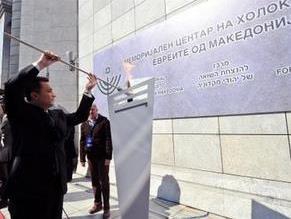|
World Jewish News

Macedonian Prime Minister Nikola Gruevski (L) lights the eternal flame in Skopje on March 10, 2011 in memory of the Jews from Macedonia who were executed in the concentration camp at Treblinka. Photo: Robert Atanasovski, AFP Copyright 2011
|
Holocaust memorial museum inaugurated in Skopje, Macedonia
11.03.2011, Holocaust A museum dedicated to the memory of the Jews of Macedonia who perished in the Holocaust was inaugurated in the former Yugoslav republic, in the presence of the country's president and representatives of international Jewish organizations.
The modern, multi-million dollar edifice stands in the heart of what was once the city's Jewish quarter, in the center of the Macedonian capital Skopje.
It was built by the Jewish community of Macedonia, which today
numbers some 100 members. Macedonian Jewry benefited from a 2002 law providing for the return of heirless Jewish property, a law that is widely recognized as one of the best in Europe.
At a ceremony, Macedonia was hailed for enabling the Jews to regain the assets they had lost in the Holocaust.
The cornerstone for the museum was laid in 2005.
Ljiljana Mizrahi, president of the local Holocaust Fund that had initiated the project, opened the ceremony by reading the names of some of the victims and explained that the museum would "preserve the memory of the Jews of Macedonia, not only commemorate their deaths, but also their lives and the civilization that perished with them."
In his address, Macedonian President Dr. Gjorje Ivanov recalled the long history of co-habitation between Jews and Macedonians of other faiths and said that with the loss of the Jews "a part of Macedonia had been torn out and that on the Jewish streets of Skopje, Bitola and Stip, after the war there was silence."
World Jewish Congress (WJC) Research Director Laurence Weinbaum pointed out that no Jewish community in Europe had suffered a greater degree of destruction than the Macedonian one.
Referring to Macedonia's principled stand on the restitution issue and to its unwavering friendship with Jews and Israel, he said: "In much of contemporary Europe, dead Jews are respected, but live ones are defamed. You honor the dead and the living, and in so doing you have set an example to which other nations could and should aspire.”
In April 1941, Macedonia - then a part of Yugoslavia - was occupied by Bulgarian troops. In contrast to its policy back home, Sofia instituted a regime of terror and plunder against Macedonian Jews.
That policy culminated in the deportation in March 1943 of some 7,200 Jews to the German death camp at Treblinka, from which not a single one returned. Some 98 percent of the Jews were killed. The only survivors were those who had managed to evade deportation, many of whom fought with the partisans.
EJP
|
|
